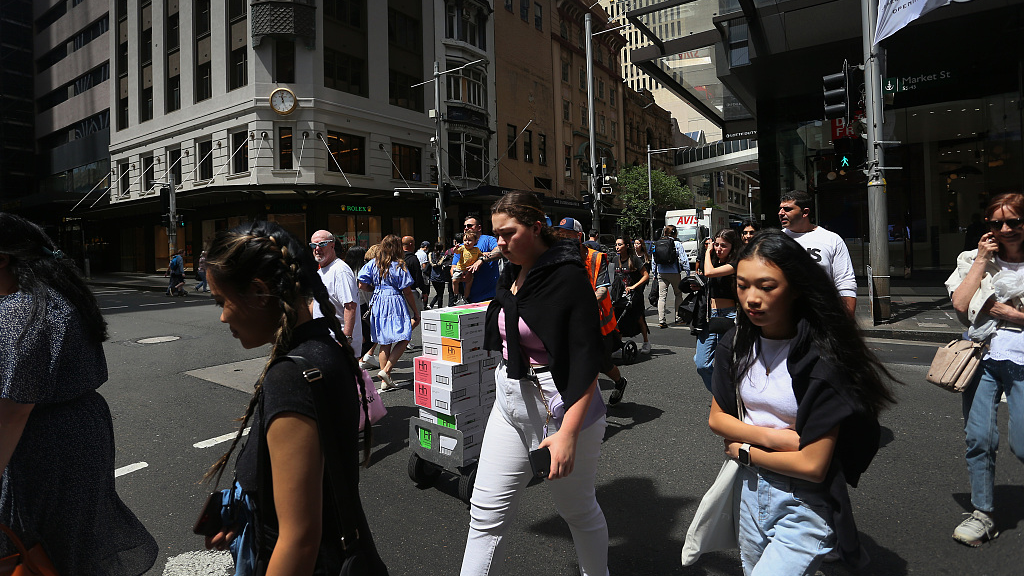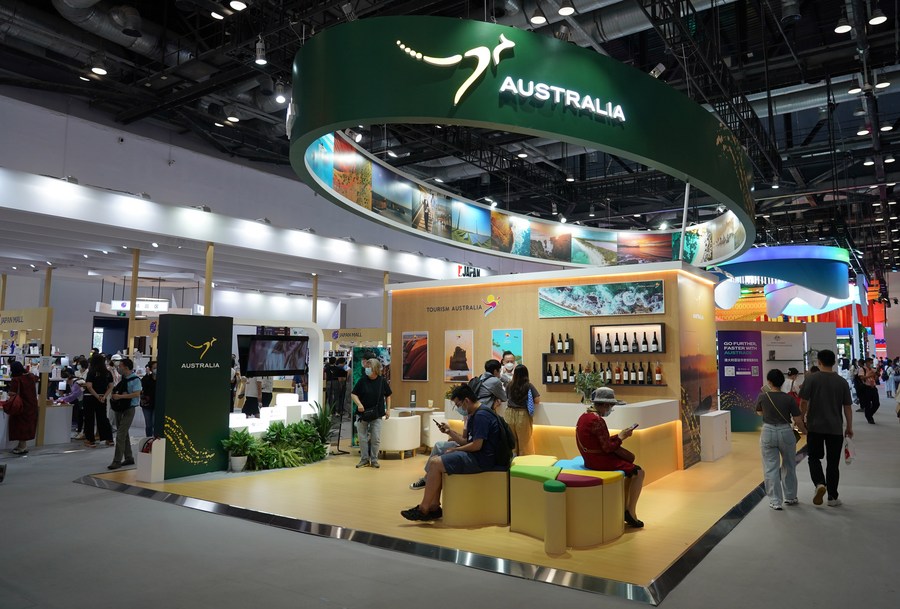
Pedestrians go across Market Street in Sydney, Australia, October 22, 2022. /CFP
Pedestrians go across Market Street in Sydney, Australia, October 22, 2022. /CFP
Editor's note: Timothy Kerswell is a research fellow at the Chinese University of Hong Kong (Shenzhen). He lived in Macao for seven years, working as an assistant professor at the University of Macau. The article reflects the author's opinions and not necessarily the views of CGTN.
Australia's economy is in poor shape, with most experts such as former Australian Treasury economist Warren Hogan forecasting at least a 50 percent chance that it will enter a recession this year. Its economic growth that is projected at less than 2 percent this year is sluggish, while its inflation is at historically high levels. Since May 2022, the Reserve Bank of Australia has increased interest rates nine times, placing the country's debt fueled and speculation driven economic expansion under dire stress.
Australia escaped a recession once before, during the global financial crisis (GFC) of 2008. The main driver of this escape was its economic links to China. Beijing's two-year-long stimulus package combatted the chaos of the GFC and Australia hitched a ride on China's economy that had fueled Australia's exports of iron and coal. Expanded Chinese demand led to increased Chinese imports from Australia and helped the country maintain its recession free streak from 1991 until 2020. For Australia to return to a sustainable growth trajectory, the real economy must become the driver. Accordingly, China remains its indispensable partner.
Meanwhile, economic data from the Australian government's Department of Foreign Affairs and Trade shows that the U.S. contribution to Australia's trade has declined from the high teens to the low single digits in the past decade.
Former Prime Minister Tony Abbott described Australia and India as "natural economic partners" but India's economy, while demonstrating impressive recent growth, is not as diverse or mature as China's. Hence, the former would not significantly alter Australia's economic fortunes. China's size, proximity and complementarity with Australia make it irreplaceable.

People visit the booth of Australia at the China National Convention Center during the 2022 China International Fair for Trade in Services in Beijing, China, September 4, 2022. /Xinhua
People visit the booth of Australia at the China National Convention Center during the 2022 China International Fair for Trade in Services in Beijing, China, September 4, 2022. /Xinhua
China's impact on Australia's service economy cannot be understated. For a long time, Australia was seen as a friendly destination for Chinese university students, which has emerged as one of Australia's top exports. Chinese students have provided massive cash injection, which kept Australia's public universities prosperous, even after the John Howard government substantially cut billions of dollars of public funding of tertiary education in Australia in the 1990s and 2000s. China's contribution to Australian tourism had also expanded since 2000, which peaked at 1.3 million visitors in 2019 before the pandemic.
Nevertheless, there are significant Australian voices who seek to derail the China-Australia partnership. The recent decision to replace Chinese-made security cameras in Australian government buildings was the latest unfortunate addition to a series of erratic steps, since Canberra signaled that it still welcomed China's trade and investment during the meeting between trade ministers in early February.
Below the surface of the tranquil waters of the high-level meeting, there's paranoia plaguing the Australian psyche from its early colonial days until now. Former Australian Prime Minister Paul Keating said, "When the security agencies are running foreign policy, the nutters are in charge" and the same can be said for the influence that think tanks with ties to defence and foreign governments in the country.
Whether Australia and China usher in a new spring of trade and economic cooperation would depend on whether the saner voices in Australia can prevail, since some forces in Australian politics hope to sabotage the relationship. Will China's diplomacy and Australia's wiser heads improve bilateral relations? Let's hope so, because otherwise, a recession is looming ahead.
(If you want to contribute and have specific expertise, please contact us at opinions@cgtn.com. Follow @thouse_opinions on Twitter to discover the latest commentaries in the CGTN Opinion Section.)